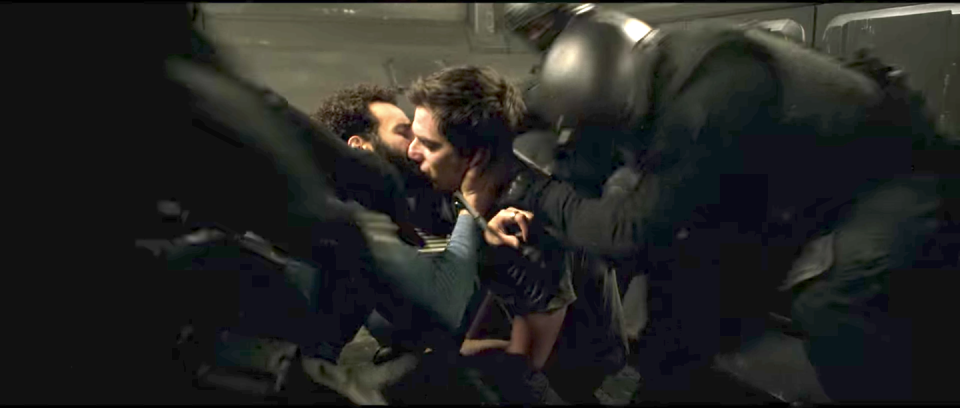2020's Best Action Movie Is Also a Gay Love Story
Netflix's latest blockbuster-level action movie, The Old Guard, covers a lot of very similar ground to other recent big-budget offerings from the streaming platform, like the Chris Hemsworth vehicle Extraction or Michael Bay/Ryan Reynolds collab 6 Underground. In fact, The Old Guard is a pretty conventional superhero movie in many ways, employing many of the same narrative decisions that audiences have come to expect and enjoy—with a couple of exceptions.
(Warning: plot spoilers follow.)
The main thing that sets The Old Guard apart from its high-octane counterparts is that the movie's central team of immortal warriors, led by Andy (Charlize Theron), includes a gay couple. When Joe (Marwan Kenzari) and Nicky (Luca Marinelli) are first introduced, their relationship to each other isn't immediately evident, until 45 minutes in, when they reveal to newcomer Nile (KiKi Layne) that they have been inseparably in love for nearly a thousand years.
It's become something of a cliché for a filmmaker or actor to say that a character "just happens to be [insert identity]," and to depict them in the exact same way that they would anyone else, or to only obliquely refer to the character's sexuality in a throwaway line of dialogue or deleted scene. Famous examples of this in recent years include the "straightwashing" of comic characters like Deadpool and Valkyrie when transposing them from the page to the big screen.
But in the case ofThe Old Guard, the diversity of its characters is far from incidental; it actually elevates an otherwise rote premise. As the film progresses, Joe and Nicky's love story becomes an increasingly prominent part of the film's overall plot, and much of the online excitement around The Old Guard has centered on a scene in which Joe gives an impassioned speech about just how much Nicky means to him.
When Joe speaks of his millenia-long love for Nicky, it lends weight to the scene because the viewer can only begin to imagine how much bigotry a gay couple would have experienced through the centuries. When the van door opens and we see that Joe and Nicky have slaughtered their homophobic captors, it's a moment that the movie plays for laughs—but their relationship is never the joke.
When they say love is eternal, they're talking about Joe and Nicky. pic.twitter.com/QIx9hMgazR
— NetflixFilm (@NetflixFilm) July 11, 2020
In fact, Joe and Nicky are the only romantic pairing given any real screentime in the entire movie, and seeing these two men fight tooth and nail for each other makes some of the film's bone-crunching, hyper-violent action sequences feel cathartic, rather than desensitizing. That they also both make it out alive and into the clearly-foreshadowed sequel is a refreshing change of pace for Hollywood. We also can't overlook how an openly gay man swooping in through a window on a bungee rope to save the day, in classic action-hero style, has literally never been seen before on-screen. (Sorry, Marvel, but Netflix beat you to it by four whole months.)

Similarly, the casting of KiKi Layne as Nile, the newly initiated immortal, subverts narrative expectation. This heroic archetype is almost always portrayed as a young white man; think Luke Skywalker, Harry Potter, Neo, Spider-Man. This trope takes on new dimensions in the movie's climactic final act; the image of a Black woman taking on a horde of identical white men in riot gear, whose hail of bullets cannot stop her, is one that will strike a chord with audiences in 2020. Again, cliché becomes catharsis.
Whenever a mainstream movie includes non-white, non-cishet characters and storylines, there are complaints from some corners of "forced diversity." In the case of The Old Guard, this representation is not forced—it's a part of the source material. But the very notion of forced diversity implies that marginalized characters are tacked on or inserted into a story where they serve no narrative purpose. If anything, this movie makes a case for considered diversity. In other words, resisting the temptation to follow the same lazy storytelling conventions and finding newer, creative ways to engage a wider audience. These are the kinds of creative decisions that make for a more memorable—and frankly better—movie.
You Might Also Like
